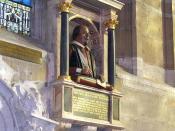William Shakespeare was a philosophical writer because he was able to look past appearances and analyse reality, he displays his gift in the plays he writes by analysing human nature, and is why Shakespearean plays are so renowned and well-known. "Hamlet" is one of Shakespeare's most famous plays capturing the interest of scholars and writers alike. Hamlet's premonitions of human nature reveal the universal truths of human nature. Hamlet reveals the innate reactions when faced with turmoil in the forms of deceit, corruption and revenge. Shakespeare's truths about the human nature that remains genuine throughout history and is why Hamlet is so highly debated for many years to come.
Shakespeare uses stylistic devices to convey many messages he to the audience, however Shakespeare uses the theme of appearance versus reality a number of times in his plays. Deceit in human nature is displayed by Hamlet when he puts up an "antic disposition" to hide his true intentions, he tricks all of Denmark and confuses play writers and English teachers whether he is actually mad or not.
Shakespeare states human nature deludes for the good of others. "I must be cruel, only to be kind:" (Shakespeare 199) Hamlet has to be brash for the good of others. In Hamlet deceit in human nature does not necessarily mean the ill of others, Hamlet deceives for the good of his mother and his past father. But deception is not always for the good of others because of opportunism and a vengeful spirit towards others. Hamlet's initial intent of his antic disposition was to hide his knowledge that he knows Claudius killed his father he plots the downfall of his step-father behind an arras of lunacy. Hamlet states "That I essentially am not in madness, But mad in craft" (Shakespeare 199) he admits he...


